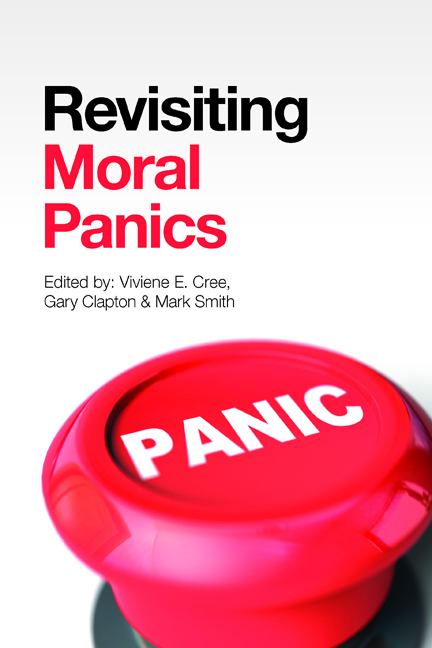Book contents
- Frontmatter
- Contents
- Contributors
- Preface
- Commentary moral panics yesterday, today and tomorrow
- Part One Gender and the family
- Part Two Moral panics in our time? Childhood and youth
- Part Three The state, government and citizens
- Part Four Moral crusades, moral regulation and morality
- Afterword the moral in moral panics
- Conclusion Moral panics and beyond
- Index
Seventeen - Animal welfare, morals and faith in the ‘religious 211 slaughter’ debate
Published online by Cambridge University Press: 08 March 2022
- Frontmatter
- Contents
- Contributors
- Preface
- Commentary moral panics yesterday, today and tomorrow
- Part One Gender and the family
- Part Two Moral panics in our time? Childhood and youth
- Part Three The state, government and citizens
- Part Four Moral crusades, moral regulation and morality
- Afterword the moral in moral panics
- Conclusion Moral panics and beyond
- Index
Summary
Much of the discourse on contemporary ‘moral panics’ has evolved within the fields of social work and social policy, with obvious examples including child abuse, urban crime, youth culture and immigration. In this chapter, however, a moral panic will be considered centring on the welfare of animals slaughtered for meat according to the requirements of Islam and Judaism.
Introduction
On 17 February 2014, the Danish government banned the slaughter of farm animals without pre-stunning. Denmark thus joined Sweden, Latvia and Poland, the three other European states in which non-stun slaughter is already prohibited (Ferrari and Bottoni, 2010; Anon, 2012). The ban was controversial because some Muslim and many Jewish authorities regard the absence of stunning prior to slaughter as a requirement for the meat to be halal or kosher (which means ‘permissible’) under Islamic and Jewish law. The resulting public debate differed markedly between countries. In Denmark, it centred on whether the prohibition was compatible with the right of Muslims and Jews to religious freedoms. In practice the ban changed nothing, as no non-stun slaughter had in fact taken place there for a decade. Since the last abattoir licensed to perform it closed in 2004, those of the country's 220,000 Muslims and 8,000 Jews who have wished to consume halal or kosher meat produced without stunning have imported it. Some commentators suggested that the ban, which was obviously associated with animal welfare, was introduced to appease the outrage surrounding the slaughter of a giraffe eight days earlier at Copenhagen Zoo and the public feeding of its carcase to the lion pack. This prior episode had nothing to do with religion.
In the United Kingdom, the Danish ban had the effect of focusing attention onto the absence of any similar prohibition in domestic law.
The result was several days of debate that displayed most of the classic features of a moral panic as defined by social theorists such as Cohen (2002) and Thompson (1998, pp 1–30). A campaign quickly developed that was intense even if of brief duration, and the news media played a prominent role in presenting and sustaining it. Strong action was called for, with links made to wider anxieties about social fragmentation or breakdown, in this case due to Islam in Britain.
- Type
- Chapter
- Information
- Revisiting Moral Panics , pp. 211 - 220Publisher: Bristol University PressPrint publication year: 2015



